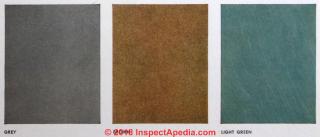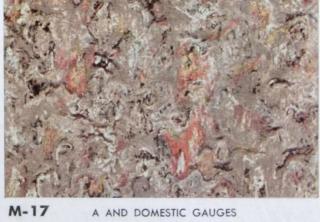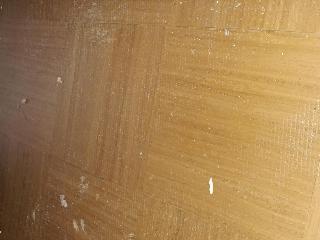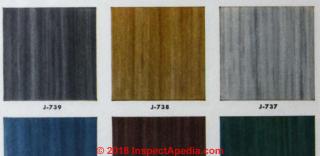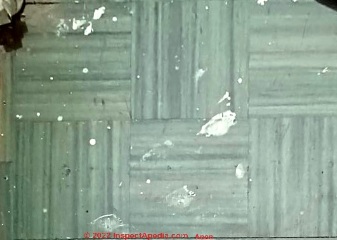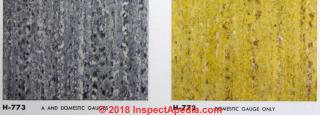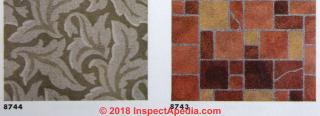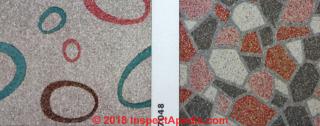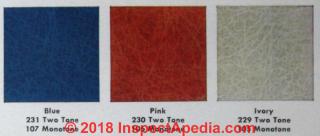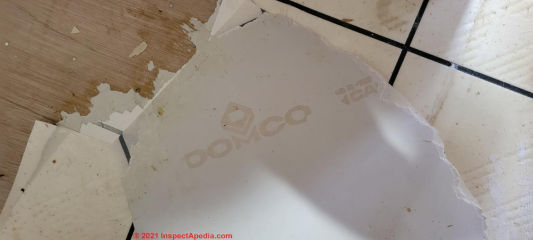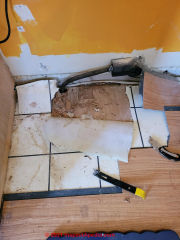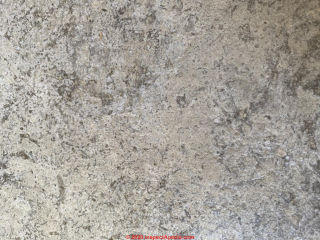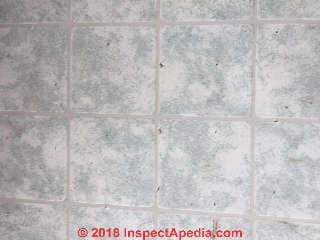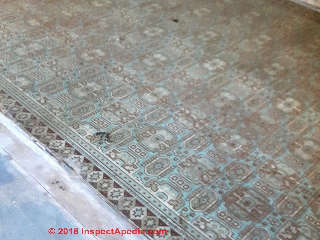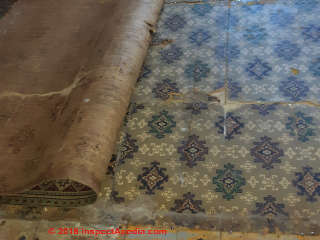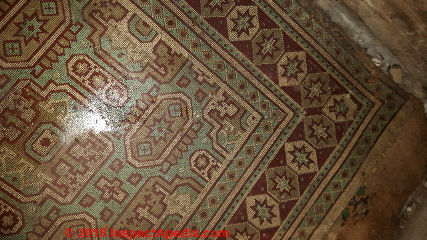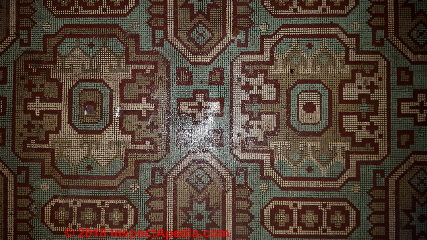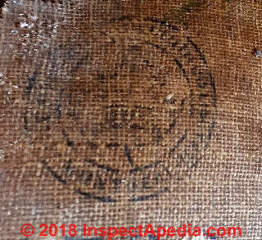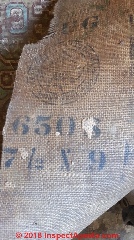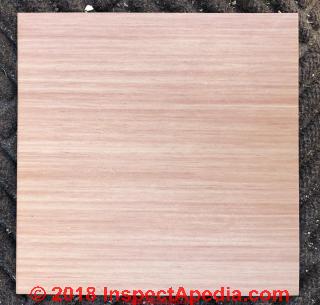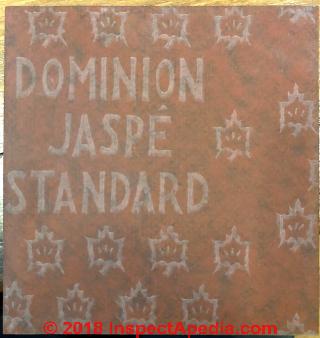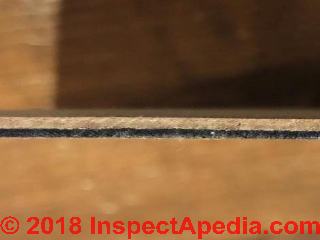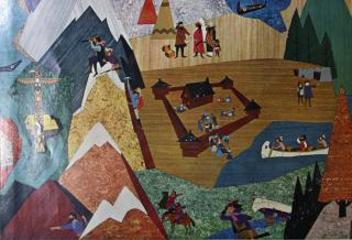 Dominion & Other Canadian Flooring Products
Dominion & Other Canadian Flooring Products
Canadian Floor Covering History, Components, Identification
- POST a QUESTION or COMMENT about the history, uses, & ingredients in linoleum floor coverings
Dominion & other Canadian Flooring Materials that may contain asbestos:
History, Components, Identification of Dominion & other Canadian flooring products: this article includes information about Dominion flooring produced and sold in Canada as part of our series on the history of linoleum, linoleum ingredients, and the properties of linoleum resilient or sheet floor coverings.
The page-top illustration, from the Dominion flooring catalog cited in this article, was " ... composed of actual pieces of linoleum chosen from Dominion's range of over 100 modern primaries, shades, tints and patterns?"
InspectAPedia tolerates no conflicts of interest. We have no relationship with advertisers, products, or services discussed at this website.
- Daniel Friedman, Publisher/Editor/Author - See WHO ARE WE?
Canadian Linoleum Floor Coverings: Congoleum & Dominion Sheet Linoleum & Floor Tiles
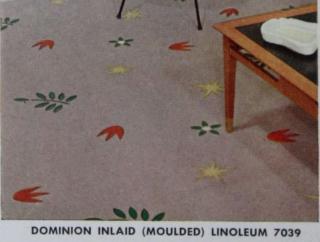 Illustrated: Dominion Oil Cloth & Linoleum sheet flooring, canvas-backed, from 1956-1957. [Click to enlarge any image]
Illustrated: Dominion Oil Cloth & Linoleum sheet flooring, canvas-backed, from 1956-1957. [Click to enlarge any image]
The Dominion Oilcloth & Linoleum Company, Canada's largest producer of linoleum sheet goods and tile flooring, was founded in 1872.
According to a 1956 Dominion catalog provided in this article, the company sold oilcloth, floor coverings in both sheet flooring and floor tile formats, wall coverings, and countertop coverings across Canada.
Until that year, the Dominion Oilcloth and Linoleum Company's extensive product line of linoleum sheet flooring, tiles, and wall coverings included some vinyl products and also provided flooring waterproof adhesives, linogrip adhesive, liquid wax, flooring installation tools, and cove base for finishing the wall/floor intersection, or for use as splash boards.
Dominion's floor tiles included Tilecraft, Marboleum, Jaspe, Handicraft pattern families as well as specialty tiles, motifs, and insets.
Dominion's sheet flooring or area floor coverings, referred to as yard goods, included solid colour Battleship Dominion Linoleum for heavy traffic areas sold in both 2-yard-wide canvas-backed sheet goods and in 9" x 9" and 12" x 12" floor tiles cut to order - shown below. Special to-order floor tiles could be ordered cut in squares of 6", 12", 18", and even 36" dimension.
Dominion Oilcloth & Linoleum Co. Ltd. had offices in Montreal, Quebec , Vancouver B.C., Edmonton Alberta, Winnipeg Manitoba, A selling agent in Toronto, Ontario, and a Canadian Maritimes representative in Halifax, Nova Scotia.
In 1967 a merger of Dominion Oilcloth and Linoleum Company, the Congoleum Corporation and the Barry and Staines Linoleum Company formed Domco, Inc., the flooring product range shifted to focus on vinyl products, and Domco formed its own distribution network. In the early 1970s the company experienced financial difficulties culminating in the sale of its historic headquarters in Montreal. (Tarktt ret. 2018).
Is there Asbestos in Dominion Flooring?
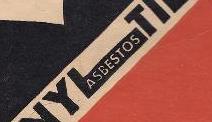 We don't know if all Dominion brand flooring contained asbestos but we know for sure that some did, as per the photo contributed by InspectApedia.com reader Brian (2019/03/23).
We don't know if all Dominion brand flooring contained asbestos but we know for sure that some did, as per the photo contributed by InspectApedia.com reader Brian (2019/03/23).
I haven't found an authoritative source, haven't received reader asbestos lab test results on the full line Dominion flooring products, and will welcome reader or Dominion Co. comments on this question.
Watch out: don't panic about asbestos - doing so may waste considerable money, but also don't be careless about disturbing asbestos material.
To be prudent and unless you know that a flooring material does not contain asbestos OR unless you've had a sample tested, treat asbestos-suspect flooring in Canada as PACM - Presumed Asbestos Containing Material: that means avoid making a dusty mess by sanding, grinding, chopping, etc.
Asbestos is safe and legal to remain in homes or public buildings as long as the asbestos materials are in good condition and the asbestos can not be released into the air.
Generally the safest course with asbestos materials in buildings is to leave the material alone, intact, un-disturbed, encapsulated or covered-over if possible.
You can improve the "guess" about your particular DOMCO flooring at
DOES THIS FLOOR CONTAIN ASBESTOS? - 5 easy questions to tell if your FLOOR probably contains asbestos
On 2019-03-23 by (mod) - some DOMCO Flooring packaging specifically refers to containing Asbestos
Thank you Brian that's very helpful; we'll keep your photo with this article.
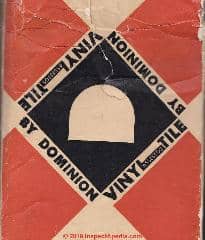
If you can tell me the age of the building where this flooring was installed (or even the estimated flooring age or year of installation) and if you have photos of the flooring itself, front and back surfaces, that'd be terriffic data to add.
In any event, thank you.
On 2019-03-23 by Brian
I have this box from dominion, claiming the tiles do contain asbestos. Hope this helps.
Dominion Flooring Styles & Examples (continued)
Dominion also produced canvas-backed sheet flooring sold as Cork Carpet sold in "A" gauge (1/4" thick) and "B" gauge (3/16" thick) in grey, brown (cork pattern) and light green colours - illustrated below.
The company offered as well sheet flooring in these patterns: Marboleum, sold in 17 colours in a marble pattern. Marboleum was sold in two-yard-wide felt-backed flooring in A-gauge and for some colours, also in "Domestic" gauge.
Above: Dominion's Marboleum sheet flooring
Other Canadian Dominion floors included sheet and tile flooring sold as: Jaspe Linoleum in 13 colours as well as Handicraft, Embossed, Tiling, and Moulded pattern families.
Above: Jaspe-like Dominion flooring in a Canadian home, submitted by reader Jimmy. May 2018.
All of the Jaspe flooring patterns show parallel colour variations such as in our example just below. Jaspe was described as "resilient, rich cork composition" made in both sheet goods and floor tile dimensions.
Below we include a similar flooring pattern as the Jaspe above, in green, posted by a reader Q&A
at ASBESTOS FLOOR TILE IDENTIFICATION GREEN.
Dominion's felt-backed Handicraft linoleum floor series was produced in fabric-toned beiges using a textured design intended to hide dust and scuff marks for customers such as hotels and offices as well as home use - shown below.
Dominion also produced printed felt base goods sold by the yard, under the Rexoleum family name including Rexoleum Gravure, deLuxe, Standard, Passage, and Rexoleum Rugs and Mats.
Below we show an example of Canadian Dominion's canvas-backed Embossed Inlaid Linoleum "rugs" in two popular patterns. This sheet flooring was sold as 2-yard-wide lengths.
Dominion's canvas-backed moulded inlaid linoleum was sold in two-yard width in seven designs and fifteen shades often installed in kitchens, hallways, foyers, or bathrooms.This flooring was described as resistant to scratches and burns. Two examples are given just below.
The Dominion Oilcloth & Linoleum Company did not confine itself to floor coverings.
The company also sold Dominion wall coverings in both linoleum sheet and tile formats, counter top coverings, and a faux Vinyl Domoleather wall covering sold in 55-inch width sheet goods.
Dominion Oilcloth & Linoleum Company Product Catalog & History
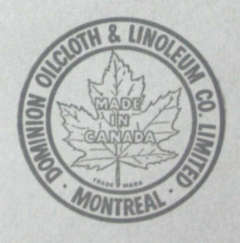 Dominion's Motif floor tiles could be ordered from these same flooring products so that they could be used as inserts in Marboleum, Jaspe, Handicraft, Tilecraft, and Battleship floor coverings. An example of Dominion's motif floor tiles is given below.
Dominion's Motif floor tiles could be ordered from these same flooring products so that they could be used as inserts in Marboleum, Jaspe, Handicraft, Tilecraft, and Battleship floor coverings. An example of Dominion's motif floor tiles is given below.
The company also provided its customers with "do-it-yourself" templates to permit customers to cut their own flooring insert patterns in a variety of shapes.
According to Tarkett, an international flooring company who reports on the history of flooring in North America,
In 1872, the year in which Jules Verne published Around the World in Eighty Days, Dominion Oilcloth was founded in Canada [by Andrew Allan and other businessmen - Ed.]. The Sommer family [later evolving into Tarkett Flooring - Ed.) set up its felt factory in Mouzon, France in 1880. ...
At the turn of the 19th century felt, hemp, jute, straw, wood and oilskin were the manufacturing staples for these precursors of Tarkett.
These savvy businessmen, who largely managed family concerns, were able to diversify production, to choose the right products for the market, to make tough decisions and to innovate to ensure success and longevity.
Thus, the Canadian company Dominion Oilcloth made the move into linoleum, which was hugely successful. At the same time, these early companies had to contend with the violent power of the elements – repeated fires, flooding of the Danube, etc.
They weathered major economic crises and they struggled through world wars which devastated the first half of the 20th century, leaving Europe in ruins.
The original Sommer family factory was destroyed in World War I. Shortages of raw materials and the war effort changed the face of North American manufacturing after World War II. ...
From about 1959 to 1996 the company did business as Domco Industries, Limited, becoming Domco, Inc., in 1995. IN 1999, thorugh mergers and acquisitions the company began doing business as Domco Tarkett, Inc. (cited below).
CANADA: FROM TARPAULIN TO LINOLEUM
In 1872, a new company appeared on the Canadian industrial landscape, the Dominion Oilcloth Company, founded in Montreal by eleven prominent local businessmen. In a small factory on the rue Sainte-Catherine, it manufactured tarpaulin, a heavy-duty painted or tar-coated canvas used to protect goods or buildings from rain or even sea water.
Tarpaulin was manufactured from cotton canvas, linseed oil and pigments.
Just two years after the company had been founded, the economic crisis of 1874 hit, affecting both Europe and North America.
 The
company weathered the crisis and in 1887 took advantage of the opening of the
Vancouver-Montreal railroad line to distribute its products throughout the country.
In the early 20th century, tarpaulin was sidelined in favor of linoleum for
floors, walls and tables. Linoleum manufacturing began at the rue Sainte-Catherine
factory.
The
company weathered the crisis and in 1887 took advantage of the opening of the
Vancouver-Montreal railroad line to distribute its products throughout the country.
In the early 20th century, tarpaulin was sidelined in favor of linoleum for
floors, walls and tables. Linoleum manufacturing began at the rue Sainte-Catherine
factory.
It was made from natural materials sourced all over the world: jute from India and Nova Scotia, kauri gum from New Zealand, and linseed oil from seed grown in western Canada, Argentina or India.
This new product was cheaper than wood, hygienic, and suitable for small and large areas alike.
The “Battleship” line, as its name suggests, was used in battleships, but also for non-military (Tarkett ret. 2018)
From at least 1921 into the late 1960s, the presidents of Canada Linseed Oil Mills also acted as managing director of Dominion Oil Cloth & Linoleum, suggesting that the two companies were financially connected.
[And confirming that at least some of Dominion's floor covering products were made using traditional linoleum processing purposes such as offices and public buildings.]
The popularity of linoleum marked the beginning of a period of extraordinary expansion.
Then, global conflicts disrupted supply lines. During World War I, the company struggled to obtain supplies of jute. To address this issue, the jute-backed product was replaced and felt-backed linoleum was launched.
When peace returned, the company redoubled its efforts. It changed its name to the Dominion Oilcloth & Linoleum Company Limited in 1919 and joined forces with the Congoleum Company of Canada Limited to increase felt-backed output.
Linoleum, a modern product which brought brightness, color and practicality to homes and public buildings, was an integral feature of the Canadian lifestyle between the wars.
Dominion Oilcloth reigned supreme in major Canadian public buildings and was used in the Ottawa Parliament in 1923 and for the Montreal railroad station concourse several years later. This highly innovative company launched Marboleum for floors in 1932, followed by Muroleum for walls, a flexible wall covering with noise-absorbing properties, in 1934.
During this same period, it acquired Barry & Staines Canada Limited, one of its competitors based in Farnham, and in 1940, bought out Congoleum.
The year 1940 also brought World War II in Canada, which dealt a severe blow to the linoleum industry. Supply routes were blocked.
The Canadian government needed linoleum for munition factories, offices, hospitals and ships, diverting product from the consumer and commercial market.
Tarpaulin production was increased to make protective covers, camouflage gear, gas masks and tents. A proportion of the linoleum production capacity was put on hold to make way for the manufacture of aluminum airplane components until peace returned.
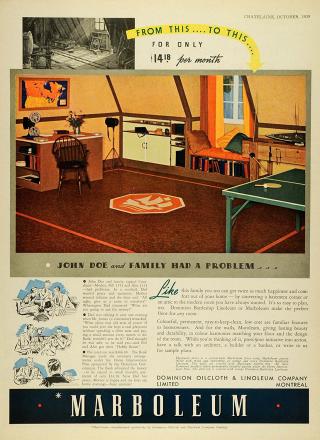 ... The year 1967 brought major changes to the company. Manufacturing shifted
to Farnham with the creation of Domco Inc., born of the merger between Dominion
Oilcloth and Linoleum Company, the Congoleum Corporation and the Barry and
Staines Linoleum Company. The product range was reduced to focus primarily on
vinyl.
... The year 1967 brought major changes to the company. Manufacturing shifted
to Farnham with the creation of Domco Inc., born of the merger between Dominion
Oilcloth and Linoleum Company, the Congoleum Corporation and the Barry and
Staines Linoleum Company. The product range was reduced to focus primarily on
vinyl.
Also in this year, Domco created its own distribution network – as a result, Domco had warehouses in major Canadian cities and a network of representatives who could offer retailers supply and credit services. (Tarkett ret 2018)
Shown here: Chatelaine Magazine magazine advertisement for Dominion Oilcloth & Linoleum Ltd. advertisement for Marboleum, October 1939. Chatelaine magazine was first published in March, 1928 by Maclean Hunter Publishing as a style magazine for Canadian women.
- Spacing Toronto, "Building Storeys - the Canada Linseed Oil Mills buildings & Sorauren Park (2010) retrieved 2018/04/26, original source: http://spacing.ca/toronto/2010/04/09/building-storeys-the-canada-linseed-oil-mills-buildings-sorauren-park/
- DOMINION OILCLOTH & LINOLEUM CATALOG & FLOORING PRODUCTS 1956 [PDF], Dominion Oilcloth & Linoleum Co. Ltd., 2200 St. Catherine Street East, Montreal 24 Canada with offices in Edmonton, Toronto, Vancouver, Toronto, Halifax
This document describes Dominion's flooring products including Battleship, Marboleum, Handicraft, Tilecraft, and Jaspe flooring, Rexoleum rugs, mats, floor coverings, printed felt base goods sold by the yard. The company also sold wall coverings and counter top coverings. - DOMINION OILCLOTH & LINOLEUM CATALOG 1963 [PDF] [large file over 100MB, slow loading, be patient] Op. Cit., retrieved 2018/10/25, original source: Internet Archive https://ia800305.us.archive.org/0/items/DominionOilclothLinoleumCo.Limited/CCA71963.pdf
Note use in 1963 of the company's product names such as Marboleum (as shown in the advertisement here) and the company's note that
Dominion Linoleum, once termed a "utilty flooring", is now an acknowleged "high style" flooring for the living areas of the modern house as well as all areas of the modern business and public buildings.
Dominion's product names in 1963 illustrate sources of confusion wrought by the very broad use of the word "linoleum" to include products that had none of the original ingredients of true linoleum (linseed oil) such as cork flooring.
Marboleum, Dominion Jaspe Linoleum, Dominion Handcraft Linoleum, Dominion Plain and Battleship Linoleum (a cork "carpet" flooring product), Dominion inlaid linoleum (tiling), Dominion inlaid linoleum (embossed), Dominion inlaid linoleum (moulded), motifs, Dominion linoleum tiles, Dominion linoleum wall covering, Rexolite, counter topping, Rexoleum (deluxe qualith), Rexoleum (standard quality), Passage Rexoleum (deluxe qualith), Passage Rexoleum (standard quality), Rexoleum Rugs (De-Luxe quality), Rexoleum mats, as well as Dominion flooring installation tools, mastics, adhesives, and helpful tables for product estimation and layout. - TARKETT, a TALE of ENTERPRENEURS, [PDF]
Tarkett USA, 2728 Summer St.
Houston, TX 77007
USA Tel: 800–877–8453
Website: http://www.tarkett.com (Traditional or historic linoleum floor patterns, also vinyl flooring)website: https://www.tarkett.com/ retrieved 2018/05/06, original source: https://www.tarkett.com/sites/default/files/Tarkett%20History%20Book.pdf
Website excerpt:
Tarkett Group leadership is the result of 130 years of flooring experience, thanks to the talent, values and commitment of generations of entrepreneurs. Initially known as Allibert and Sommer, the company’s story begins with the ideas, energy and commitment of its founding entrepreneurs. - https://www.tarkett.com/en/content/history - [1] Armstrong, Portugal: Ingredients of Linoleum, web search 03/31/2011, original source: http://www.armstrong.pt/commflreu/es-pt/ingredients.html
- Armstrong Corporation, Corporate History - https://www.armstrongflooring.com/corporate/corporate-history.html - Web Search 05/19/2010
- Chatelaine (magazine), One Mount Pleasant Rd.
8th Floor
Toronto, ON
M4Y 2Y5
Canada
Tel: (416) 764-2000 Website: http://www.chatelaine.com/, Wikipedia, retrieved 2018/05/06, original source https://en.wikipedia.org/wiki/Chatelaine_(magazine).
Wikipedia provided background information about some topics discussed at this website provided this citation is also found in the same article along with a " retrieved on" date. Because Wikipedia and other website entries can be amended in real time, we cite the retrieval date of such citations and we do not assert that the information found there is always authoritative.
Canadian Congoleum Rugs
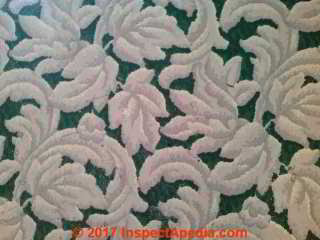 This photograph of the green and white floral pattern Congoleum rug was provided courtesy of an anonymous reader.
This photograph of the green and white floral pattern Congoleum rug was provided courtesy of an anonymous reader.
Our reader guessed that this floor covering was installed in 1949 and remained there until it was found under other layers of flooring and then removed from its Canadian home in 2017.
Details about this Canadian floor covering are
at 1928 CONGOLEUM RUGS SHEET FLOORING - Canadian Congoleum
Other sheet flooring from the same home and provided by the reader can be seen
at IDENTIFY SHEET FLOORING TYPE, HOW TO.
CONGOLEUM FLOORING HISTORY gives details about the history of linoleum and the Congoleum corporation.
Questions & Answers about Identifying Canadian Sheet & Tile Flooring
...
Reader Comments, Questions & Answers About The Article Above
Below you will find questions and answers previously posted on this page at its page bottom reader comment box.
Reader Q&A - also see RECOMMENDED ARTICLES & FAQs
On 2021-08-14 by inspectapedia.com.moderator (mod) - Asbestos in some Canadian DOMCO vinyl- flooring
Domco is a Canadian flooring product some of which contained asbestos as you will find under that name in the INDEX TO RELATED ARTICLES - or
See details at DOMINION & Other CANADIAN FLOORING ASBESTOS
On 2021-08-13 1 by Sarena Carr
@inspectapedia.com.moderator, Here is a picture of the back of the flooring
On 2021-08-11 by inspectapedia.com.moderator (mod)
@Sarena Carr,
Our best advice for you in answering this question is given at
DOES THIS FLOOR CONTAIN ASBESTOS? - 5 easy questions to tell if your FLOOR probably contains asbestos -
Please take a look and let me know if that leaves you with questions.
On 2021-08-10 by Sarena Carr
Can you tell me if the white flooring is asbestos?
Thanks [Photo above]
On 2021-03-26 by (mod)
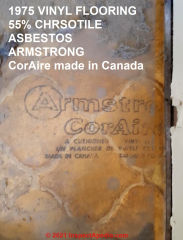 @Ejk, Thank you that's very helpful; we'll be sure to keep your asbestos test result with your photos of 1975 Armstrong CorAire flooring
@Ejk, Thank you that's very helpful; we'll be sure to keep your asbestos test result with your photos of 1975 Armstrong CorAire flooring
I'll also copy this data over to our page on asbestos in Canadian flooring products.
On 2021-03-26 3 by Ejk
Testing confirmed 55% chrysotile asbestos
On 2021-03-21 - by (mod) -
@Ejk, quite possibly given the age and pattern of flooring;
For other readers,
More Canadian flooring asbestos discussion is at DOMINION & Other CANADIAN FLOORING ASBESTOS https://inspectapedia.com/interiors/Dominion-Flooring-Canada.php
Also see ARMSTRONG CORLON FLOORING
On 2021-03-21 by Ejk
[The Armstrong CorAire vinyl sheet flooring was] found in a home in Canada built 1975. Would this contain asbestos?
On 2020-10-23 by (mod) - treat white-backed Domco flooring from the 1970s as presumed to contain asbestos
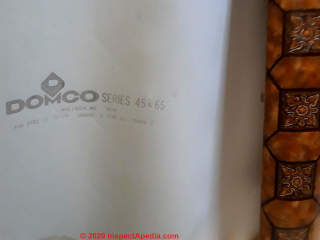 Robert
Robert
Thank you for the DOMCO flooring photo and asbestos question.
Certainly at least some such flooring contained asbestos.
With that white backing I'd treat the DOMCO flooring as presumed to contain asbestos (or have a sample tested).
When it's possible to remove flooring by simply lifting or rolling it up, and when you've avoided creating dust by demolition, the potential asbestos hazard is probably beneath the limits of detection,
and
as you'll read throughout this article series, the best, safest, least-expensive advice for asbestos flooring is to leave it in place and cover it over if possible.
On 2020-10-22 by Robert Ketcheson
Hi....I was planning on removing the sheet flooring from the basement stairs in my house (built around 1975) to install a carpet stair runner.
The tile had been glued down to the riser, and when removing it I discovered that the white fiber backing left behind may contain asbestos. I'm not sure, but certainly it didn't cross my mind until after removing the sheet vinyl.
I have since covered the entire riser (and remaining sections of backer) with duct tape, and plan on covering the stirs with full width carpeting now rather than a runner. Can you confirm if this contains asbestos? Thank You.
Found some old flooring and noted the stamp on the back: (see photo)
Domco Series 45 + 65
FHA/SCHL #7978
FHA Spec 001641
(Ameni)Type iii Class 3
On 2020-04-25 - by (mod) - current (2020) floor tiles sold at Menards - compare with recent Canadian Armstrong flooring
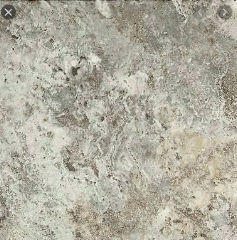 Laurie
Laurie
Sorry, but no, I can't say much about your floor tile with no more information, except to suggest that from its appearance, as you can confirm by looking through the photos in this article series,
your floor does not look much like flooring from the 1960s or 1970s. It's likely to be a newer product.
You can confirm that (or disagree) by looking through the tile image photos in this article series.
You don't give country and city where the building (hosting this floor tile ) is located though presumably in Canada,
but I note that your image resembles this floor tile from Menards building supply stores - currently available.
On 2020-04-25 by Laurie - do these white-gray floor tiles contain asbestos?
Hi,
I have no idea what year the tile in my home was put down, it’s a very old house with many updates and an addition over the years.
There are numbers on the back of the tile, it was manufactured by Armstrong in Canada.
Are you able to tell me if it is likely to have asbestos?
Thank you!
On 2020-05-19 by Anonymous
@Laurence,
Thanks Dan.
On 2020-05-19 by (mod) - asbestos in 9-inch Floor tiles, 1958 Toronto Home
Laurence I would treat that floor as presumed to contain asbestos -
see also
ASBESTOS FLOOR TILE IDENTIFICATION GREEN
ASBESTOS FLOOR TILE IDENTIFICATION WHITE
On 2020-05-18 by Laurence
Hello, I have 9" floor tiles in a house built in 1958 in Toronto, Canada.
Any thoughts on if these are asbestos tiles?
I've looked through your catalogue and they look similar but not identical to your photos shown.
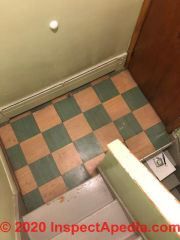
On 2019-06-19 by (mod)
Kenneth,
I don't have detail about that point in the history of the company but I will do some research and whatever I can find I will add here. Thanks for the interesting historical detail and question.
On 2019-06-19 by Kenneth Pryde
My Grandfather who was a labourer in the linoleum company, Barrie Osler and Shepherd in Kirkcaldy Scotland took his family to Canada as part of a team who were engaged to set up a new process for the Dominion Oil Cloth Company. This would be in the early 1930s. My mother, one of his daughters, was educated in Canada during this time. They returned to Scotland sometime before 1939. Do you have any information on this collaborative venture?
On 2019-01-29 by Donna
Any thoughts about potential for asbestos? House was built and floor laid in 1980.
Question: does this 12x12" Canadian wood-pattern Vinyl Tile Flooring contain asbestos?
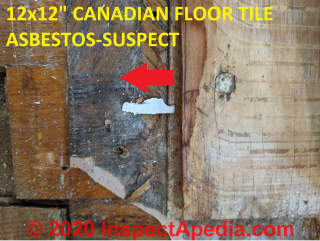 House was built early to mid 40's in Ontario, Canada. The tile layer in question resides under a layer of modern vinyl roll and plywood subfloor, and exists as I believe the original kitchen floor.
House was built early to mid 40's in Ontario, Canada. The tile layer in question resides under a layer of modern vinyl roll and plywood subfloor, and exists as I believe the original kitchen floor.
The tiles are 12" long, and assume 12x12 without lifting anything / removing existing layers. The pattern as pictured looks like alternating small squares of artificial wood grain, on horizontal, vertical and diagonal angles.
The top pattern (almost paper like) separates from the tile body relatively easily. The tile itself is a couple of mm thick, pale pink in colour with a "sparkly" look.
There's no real adhesive to speak of.
Thoughts? - Anonymous by private email 2020/07/16
Moderator reply:
I would treat the flooring as presumed to contain asbestos, though 12x12 floor tiles will be newer than the home, and not all 12x12s contained asbestos.
If you can remove the flooring without breaking it up into a dusty mess the asbestos hazard is pretty low.
Otherwise, these articles are worth a look:
ASBESTOS FLOORING HAZARD LEVEL ASSESSMENT
and
ASBESTOS FLOORING REMOVAL GUIDE
and for flooring that's secure and sound enough to keep in place - the safest approach - you'd
see ASBESTOS FLOORING LEFT IN PLACE
On 2018-10-01 by (mod) - Canadian flooring stamped 88000 86000 In-Seal Sealer
Lee Ann
I can't be sure from just the stamping and country of manufacture; indeed some asbestos-containing flooring was made in Canada.
At ASBESTOS FLOORING IDENTIFICATION
we give 5 checkpoints that can help you make a reasonable guess about whether or not your floor contains asbestos.
On 2018-10-01 by Lee Ann
We are removing old sheet flooring from a house we recently purchased. The back of the flooring has stamped on it “Made in Canada. 88000 or possibly 86000”. Another part contains the words”adhesive and in-seal sealer”. Please see photo attached. Is there asbestos in this product?
Dominion Jute-Backed Linoleum Rugs
Thanks to readers J&D for contributing these photos of these Dominion antique jute-backed linoleum rugs including a Dominion Oil Cloth & Linoleum Co. identifying stamp using that term.
[Click to enlarge any image]
Question: antique Dominion Oilcloth and Linoleum Company linoleum rugs in Ontario
We have been renovating the second floor of an old house that we just bought in Drayton, Ontario.
When we removed the carpeting we found linoleum probably from around the 1960's.
When we removed that there was more linoleum, from perhaps a decade earlier and so on right up until perhaps the 1930's.
After all these layers were removed, we found flooring from the Dominion Oilcloth and Linoleum Company (we were able to make out the stamp on the burlap backing).
We have spent hours on the internet trying to find more information about the flooring but cannot find the pattern.
We imagine it could be from the early 19th century or earlier?
Beneath this unusual abstract flooring, we found YET another layer. Again, after many hours online, we cannot find anything about it.
Are you able to tell us anything about the age of either of the floorings?
Above: 1926 or earlier, Dominion Floor Oilcloth Pattern 3556, Tenacity
They both have a burlap type backing. Only the greenish/bluish flooring has any manufacturer stamp on it. I will send the photos in a separate email as it is easier to send them from my phone than my tablet.
Reply:
Looking at these lovely photos of quite old sheet flooring, noting both the patterns and the use of jute or burlap backing suggests that this may be a 1930's or earlier product installed near the time of construction of your home.
FYI with jute backing this floor covering would not be expected to contain asbestos.
The Dominion Oilcloth & Linoleum Company (Limited) was a Canadian company that sold rugs and vinyl. The company was founded in 1872 and was located at 2200 St. Catherine Street, Montreal, Quebec.
Other lower buildings were found in Toronto, Edmonton, Winnipeg, and Vancouver. In the mid 20th century, Dominion Oilcloth & Linoleum subsided to two smaller companies, Congoleum and Barry and Staines Linoleum. Today, only Congo.
- Wikipedia entry retrieved 2018/10/25, original source: http://companiesofcanada.wikia.com/wiki/Dominion_Oilcloth_%26_Linoleum_Company.
Reader follow-up:
FINALLY after hours and hours and hours of research, we've got information on one of the two rugs I sent pictures of to you. I can confirm that both rugs are from Dominion; and the white background with the red and green motif is from the 1926 Dominion catalogue
and its a 'Dominion Floor Oilcloth' Pattern 3556, called 'Tenacity' or roughly page 110 (I saw it in another post as on page 112).
Now it could be from 1926 or earlier, as the catalogue states that 'this year there are nearly 50 designs to choose from and many are absolutely new."
With our pattern being near the end of the catalogue, we can safely assume its not a new design. So we are continuing our search to find earlier catalogues than 1926.
- 2019/02/10 by private emailD & J
Question: does Dominion Jaspe floor tile contain asbestos?
I have beige colored 9x9" tiles in my kitchen. I have no idea the date of installation. I found a box of extra's in the attic.
They are a Canadian made tile, Dominion Oilcloth & Linoleum Co. Limited was the manufacturer.
The pattern seems to be Jaspe?
The tiles are the same thickness as the new pile and stick ones I recently bought, there seems to be a black core in the middle of the tile when looking at the profile.
Any experience with this brand or tile in regards to asbestos?
This Q&A were posted originally
at ASBESTOS FLOORING IDENTIFICATION
Reply: Dominion floor tiles, Montreal Canada, sold across Canada
Jason,
You will want to see this catalog of Dominion Linoleum & Flooring Products
inspectapedia.com/interiors/Dominion-Linoleum-Products.pdf - it's a large PDF file - be patient in downloading.
I don't know your exact floor pattern though it's similar to other floors I've seen from the 70's and I agree that it looks like a good match for the Jaspe flooring pattern in Dominion's catalog that we list above.
That's because felt-based products (probably including your flooring) could have been made using felt (asphalt-impregnated paper) that contained asbestos.
With no more information about your building but assuming the floor was installed before the 1980's it would be prudent to treat it as presumed to contain asbestos.
Dominion described the same pattern as your flooring, in both tile and sheet form, but sheet flooring was also sold in a canvas-backed form.
So let's have a photo of the back of your floor tiles and perhaps we can comment further.
Reader Follow-up:
Reading the Dominion Products catalog I think my tile is J-736. It really looks like it and on the box is Patt. SJ-736-4869-47
Above: here is the requested picture of the back of the tile.
Below: Just in case it helps, here is the profile of the tile so you can see the black center part of the tile.
On 2018-04-30 by (mod) - Identifying Canadian Dominion floor tiles & sheet flooring
We agree with you, Jason. Thank you for the photos. That will assist other readers.
I agree that your floor tile looks like a good match for the Dominion Products catalog # J-736.
While true linoleum doesn't contain asbestos, the black center or backing on floor tiles was often an asphalt-impregnated "paper" material, some of which indeed contains asbestos.
Black center or backing on floor tiles was often an asphalt-impregnated "paper" material, some of which contains asbestos.
It's interesting also to note the red color of the floor tile back. It's quite similar in appearance to some Congoleum Gold Seal 1950's era flooring products.
See CONGOLEUM-NAIRN FLOOR TILES & LINOLEUM
Other "Linoleum" rug brands besides Armstrong, Congoleum or Congoleum-Nairn and Dominion included Babcon, Pabco, and Sloane.
...
Continue reading at 1928 CONGOLEUM RUGS SHEET FLOORING - Canadian Congoleum, or select a topic from the closely-related articles below, or see the complete ARTICLE INDEX.
Also see these
Recommended Articles
- 1928 CONGOLEUM RUGS SHEET FLOORING - Canadian Congoleum
- ASBESTOS FLOORING HAZARD LEVEL ASSESSMENT
- ASBESTOS FLOORING HAZARD REDUCTION
- ASBESTOS FLOORING REMOVAL GUIDE
- ASBESTOS MATERIAL REGULATIONS
- ASBESTOS REGULATIONS in CANADA
- ASBESTOS REMOVAL, WETTING GUIDE
- ASBESTOS TESTING LAB LIST
- CANADA ASBESTOS REGULATIONS
- DOES THIS FLOOR CONTAIN ASBESTOS? - 5 easy questions to tell if your FLOOR probably contains asbestos -
- FELT-PAPER-BACKED FLOOR TILES
- MASTIC, CUTBACK ADHESIVE
Suggested citation for this web page
DOMINION & Other CANADIAN FLOORING ASBESTOS at InspectApedia.com - online encyclopedia of building & environmental inspection, testing, diagnosis, repair, & problem prevention advice.
Or see this
INDEX to RELATED ARTICLES: ARTICLE INDEX to BUILDING FLOORING
Or use the SEARCH BOX found below to Ask a Question or Search InspectApedia
Or see
INDEX to RELATED ARTICLES: ARTICLE INDEX to BUILDING INTERIORS
Or use the SEARCH BOX found below to Ask a Question or Search InspectApedia
Ask a Question or Search InspectApedia
Questions & answers or comments about linoleum floor coverings, age, history, safety, materials, contents.
Try the search box just below, or if you prefer, post a question or comment in the Comments box below and we will respond promptly.
Search the InspectApedia website
Note: appearance of your Comment below may be delayed: if your comment contains an image, photograph, web link, or text that looks to the software as if it might be a web link, your posting will appear after it has been approved by a moderator. Apologies for the delay.
Only one image can be added per comment but you can post as many comments, and therefore images, as you like.
You will not receive a notification when a response to your question has been posted.
Please bookmark this page to make it easy for you to check back for our response.
IF above you see "Comment Form is loading comments..." then COMMENT BOX - countable.ca / bawkbox.com IS NOT WORKING.
In any case you are welcome to send an email directly to us at InspectApedia.com at editor@inspectApedia.com
We'll reply to you directly. Please help us help you by noting, in your email, the URL of the InspectApedia page where you wanted to comment.
Citations & References
In addition to any citations in the article above, a full list is available on request.
- America's Favorite Homes, mail-order catalogues as a guide to popular early 20th-century houses, Robert Schweitzer, Michael W.R. Davis, 1990, Wayne State University Press ISBN 0814320066 (may be available from Wayne State University Press)
- Thanks to reader Robin DiNunzio for contributing samples of cork flooring from a 1949 home M1y 2010
- Our recommended books about building & mechanical systems design, inspection, problem diagnosis, and repair, and about indoor environment and IAQ testing, diagnosis, and cleanup are at the InspectAPedia Bookstore. Also see our Book Reviews - InspectAPedia.
- In addition to citations & references found in this article, see the research citations given at the end of the related articles found at our suggested
CONTINUE READING or RECOMMENDED ARTICLES.
- Carson, Dunlop & Associates Ltd., 120 Carlton Street Suite 407, Toronto ON M5A 4K2. Tel: (416) 964-9415 1-800-268-7070 Email: info@carsondunlop.com. Alan Carson is a past president of ASHI, the American Society of Home Inspectors.
Thanks to Alan Carson and Bob Dunlop, for permission for InspectAPedia to use text excerpts from The HOME REFERENCE BOOK - the Encyclopedia of Homes and to use illustrations from The ILLUSTRATED HOME .
Carson Dunlop Associates provides extensive home inspection education and report writing material. In gratitude we provide links to tsome Carson Dunlop Associates products and services.



